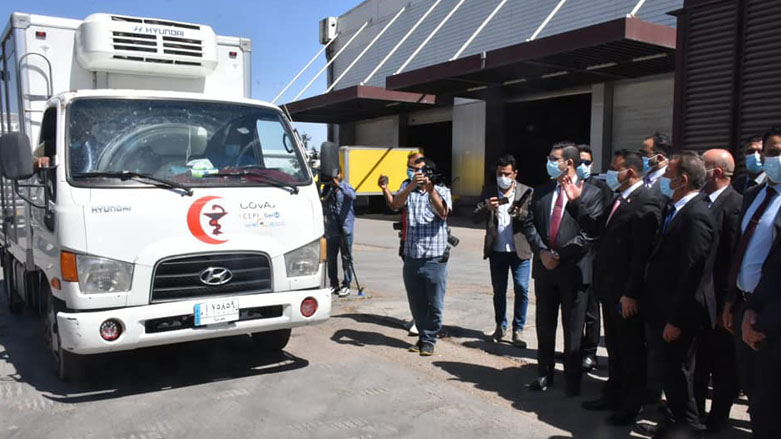Nearly 50,000 Pfizer COVID-19 vaccine doses arrive in Iraq
The Kurdistan Region has “dedicated eight vaccination centers” for the jabs, as they require minus a 70-Celsius-degree storage temperature.

ERBIL (Kurdistan 24) – Iraq on Sunday received roughly 50,000 doses of the Pfizer-BioNTech vaccination as efforts to inoculate the population ramp up across the country, according to health officials.
Iraqi authorities took possession of some 49,000 doses of the vaccine in Baghdad International Airport, which are scheduled to soon be distributed across the country, state media reported.
A portion of the newly arrived German-American vaccine is on its way to the Kurdistan Region, Erbil's health ministry told Kurdistan 24 English on Sunday.
The Kurdistan Regional Government (KRG) has “dedicated eight vaccination centers” for the jabs, as they require minus a 70-Celsius-degree storage temperature, said regional Ministry of Health Spokesperson Aso Hawezi.
“As soon as the jabs arrive, the next day, we distribute them to citizens,” he concluded.
The jabs’ arrival comes just after the country began the coronavirus vaccination process in early March, which has so far gone slower than anticipated. Reportedly, this is mainly due to vaccine skepticism.
Iraq, in its second wave of the pandemic, has lately recorded almost 7,000 new infections every day, according to official tallies released by health authorities. Despite restrictions imposed by the government to curb the spread of the virus, infections are still on the rise.
Previously, Iraq received 50,000 doses of the China-made Sinopharm vaccine, 5,000 of which were sent to the autonomous Kurdistan Region.
Currently, both Baghdad and Erbil have rolled out two versions of the coronavirus vaccine: one by AstraZeneca developed with Oxford University in the UK, and the Chinese Sinopharm.
Although the country has not recorded any cases of serious side effects, the public is highly skeptical of the vaccines.
Iraq's health ministry on Friday, in a bid to encourage citizens to receive the jabs, decided to mandate vaccination for those working in the food industry, travelers, and private healthcare providers.
The Kurdistan Region and Iraq, since the advent of the pandemic within their borders in February and March 2020, have officially seen over 918,000 infections and more than 14,000 deaths.
Editing by Joanne Stocker-Kelly